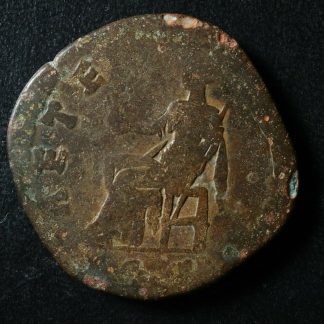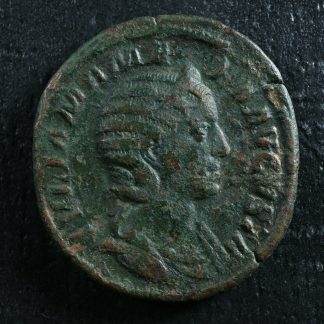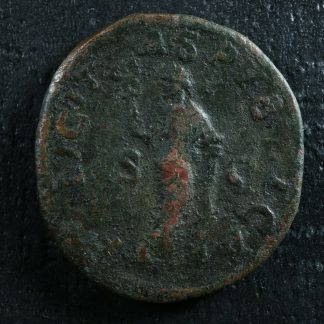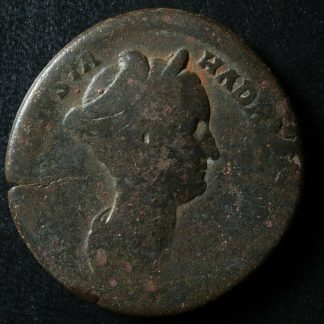Description
Commodus, Sestertius, 183, Rome
RIC III Commodus 365.
Obv.: M COMMODVS ANTONINVS AVG PIVS, Head of Commodus, laureate, right.
Rev.: P M TR P VIII IMP VI COS IIII P P S C, Hercules, nude, wearing lion skin draped over left arm, standing right, leaning on club and holding bow in left hand.
26.68 g
32 mm
Commodus (177-December 31, 192 CE) was born on August 31, in the year 161. He was a middle child and ultimately the only surviving son of the emperor Marcus Aurelius (161-180) and Faustina (the Younger died 175/6).
Commodus was given an extensive education by tutors assigned by Marcus Aurelius. He is known to have accompanied his father on throughout the empire 170s, notably to the Danubian front, then on a tour to the eastern provinces and Athens. Following an accelerated advancement in his political and public life, Commodus was first named as imperator (November, 176), consul (December, 176) and finally as full Augustus on January 1, 177. Being the biological son on a reigning emperor, the elevation of Commodus ended the period commonly known as that of
the ‘Adoptive Emperors’ (96-180).
Marcus Aurelius died on campaign, once again on the Danubian front, on March 17, 180.
Commodus only marriage was to Bruttia Crispina (178-191); she was accused of adultery in 188 and banished to Capri where she was later executed.
Following the death of Marcus Aurelius Commodus hastily concluded a treaty with the Danubian tribes and returned to Rome, where he celebrated a triumph for his having concluded the wars. Unlike the emperors immediately preceding, Commodus was not inclined to an active role in administration. This disinterest only increased following a series of conspiracies and an attempt on his life in and around 182 wherein Commodus effectively allowed his government be
run by a series of favorites, namely the freedmen Saoterus (d. 182) and (later) Cleander (later commander of the Praetorian Guard died 190) and the Praetorian Prefect Tigidius Perennis (died 185). Commodus himself retired from public life and took to participating in various sporting events, including personal combat with animals and men. Many high-ranking nobles, including Commodus’ own elder Sister Lucilla (the widow of Lucius Verus (161-169), military men and Senators were executed during this period.
Between 185 and 190 Cleander effectively ruled the Empire on Commodus’ behalf; he is rumored to have acquired great wealth by selling entry into the Senate, military commands as well as suffect consulships. Following a riot in Rome (initially caused by a shortage of food), Cleander was executed on the orders of Commodus. Another series of politically motivated executions followed.
The execution of Cleander urged Commodus to take a more active role in the administration of the Empire, though he continued to largely act through intermediaries; his mistress Marcia (died 193), another freedman-favorite Eclectus and the (new – following the execution of Cleander) Praetorian Prefect Quintus Aemilius Laetus (died 193).
The last years of Commodus reign were witness to an imperial megalomania not seen since the days of Caligula (37-41) and Nero (54-68). Commodus increasingly likened himself to a living god, often emulating and dressing/ acting as Hercules; claiming descent from Jupiter. Rome was partially rebuilt in his honor, the new city being renamed Colonia Lucia Annia Commodiana and the 12 months were renamed after the emperor himself. The legions and the navies were renamed in his honor and the colossus of Nero was retrofitted with a likeness of Commodus, a club and a
bronze lion at its feet. Commodus fancied himself an invincible gladiator, winning every bout versus often injured or hampered animals and submissive or restrained gladiators.
His end finally came when Marcia is said to have discovered a list which implicated herself, the Chamberlain Eclectus and Aemilius Laetus. The group plotted to assassinate Commodus and replace him with the Prefect of Rome – Publius Helvius Pertinax (193). Commodus survived an initial poisoning but was later strangled and drowned, supposedly by his sparring-partner and trainer Narcissus (died 193).
The death of Commodus marked the end of the Nerva-Antonine dynasty (96-192); his reign is often seen as a fall from the grace of the period of ‘Adoptive’ or ‘Good Emperors’.
Despite a relative lull in military activity during the sole-reign of Commodus, the 12 years of his sole-reign would prove to be trying for the empire and particularly the city of Rome. There were many political conspiracies, heavy and repeated devaluation of the denarius and the increasingly despotic and arbitrary behavior of Commodus himself – whose personal appearance in the arena were rumored to have cost the city one million sestertii each. Ultimately Commodus was assassinated on December 31, 192, and posthumously labelled a public enemy; for all intents and
purposes he was subject to a damnatio memoriae.
The death of Commodus did lead to the succession of Pertinax to the purple but not to a period of stability. The year 193 is now commonly known as the ‘Year of the Five Emperors’, the result of which was a sustained period, from 193 to 196, of civil war. The murder of Pertinax, after only a couple of months in power, led to the veritable sale of throne to the wealthy senator Didius Julianus (died 193, for a rumored 25,000 sestertii to every soldier of the Praetorian Guard) and the near simultaneous and individual revolts of Septimius Severus (193-211), Pescennius Niger (died 193) and Clodius Albinus (died 197).
There remains one endnote to the story of one of the most troubled reigns in Roman history. In 195, likely in an effort to justly what effetely was seen as a military coup and to gain political credibility, Septimius Severus self-adopted himself as the son of Marcus Aurelius and the brother of Commodus. Part of this process involved the rehabilitation of the memory of the hated former ruler and his later deification.
______________________________













